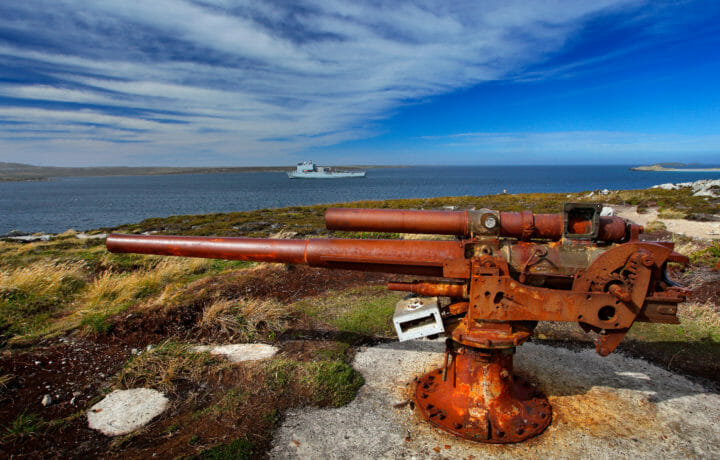Last month, on April 14, the Russian Navy’s guided missile cruiser Moskva, the lead ship of the Project 1164 Antant-class and flagship of the Black Sea Fleet, was sunk a day after the Ukrainian Navy reportedly hit her with two anti-ship cruise missiles. Moskva, which was the most powerful surface vessel in the region, was the largest warship to be sunk in combat since World War II. Her sinking occurred just shy of forty years since the last major maritime casualty, which occurred during the Falklands War.
It was on May 2, 1982 that the Argentine Navy cruiser ARA General Belgrano (C-4) was torpedoed and sunk by the British nuclear-powered submarine HMS Conqueror (S48), a Churchill-class nuclear-powered fleet submarine that served with the Royal Navy from 1971 to 1990.
The General Belgrano – which was the former World War II era United States Navy Brooklyn-class cruiser USS Phoenix (CL-46) and sold to Argentina and renamed to honor the founding father of the nation Manuel Belgrano – had a crew of some 1,138 officers and men. When she was sunk by the Royal Navy, 323 of her crew lost their lives – accounting for just under half of the Argentine military deaths in the war. Most of the sailors were conscripts and many were under 20-years of age.
The conflict over the remote Falkland Island, which ended in a British victory in June of that year, was largely seen as the last war to defend the “British Empire.”
Communications Failure
Argentina, which had been under a military dictatorship since the mid-1970s, was in the midst of a devastating economic crisis, and then President Leopoldo Galtieri sought to boost domestic support by seizing the Falkland Islands from the British.
The South Atlantic archipelago is located about 200 miles east of South America’s Patagonia coast. The British had reasserted its rule in 1833, and even declared the island chain to be a “Crown Colony” within the British Empire in 1841.
The Argentine leadership had seen that the United States had objected to the British use of force in the Suez Crisis in 1956. Believing that the UK would accept the loss of the colonies as a fait accompli, on April 2, 1982, Argentine forces mounted amphibious landings, known as Operation Rosario.
It should have hardly been a surprise.
“The official record shows that the HMS Endurance was warned that the Argentine military action was coming,” explained Dr. Howard Stoffer, professor of International Affairs in the National Security Department at the University of New Haven.
“The British government failed to heed the warnings, and the official line is that it was taken by surprise,” Stoffer told ClearanceJobs. “Later it was dismissed that the warnings weren’t ‘sent through proper channels. The biggest lesson of the invasion is that nations need to pay attention in the neighborhood.”
Upsetting the Balance
The tensions over the islands had been going on for years, and it created a difficult situation not only for London, but for Washington.
“There was the argument that the British no longer had an empire and really didn’t need the remote islands, but once they were attacked, they had to respond,” Stoffer added. “It put President Ronald Reagan in a tight spot, and he was really caught between a rock and a hard place.”
In addition to the “Special Relationship” that exists between the UK and the U.S., was the fact that both were/are NATO member states. Yet, at the same time, the United States has long maintained a policy of protecting the Americas from foreign influence. That included the Inter-American Treaty of Reciprocal Assistance, which was adopted by the original signatories in September 1947 in Rio de Janeiro, and hence known as the Rio Treaty. The United States favored the United Kingdom, arguing that Argentina had been the aggressor and that Argentina was not attacked. However, it was seen by most Latin American countries – apart from Chile and Colombia – that it was the final failure of the treaty.
Lessons for Today with Ukraine
We should take note of the recent comments made by Russian Foreign Minister Sergey Lavrov on the potential for nuclear war due to the west’s reaction to Moscow’s “special military operation” in Ukraine. Stoffer warned that we should heed the lessons from past conflicts, including the Falklands War.
“We need to pay attention to the saber rattling, which can often be just that – but we need to be cautious of when force could actually be used,” he told ClearanceJobs.
“One lesson is that when something is going to happen, you need to pick and choose what you are able and willing to defend,” Stoffer continued. “The British showed 40 years ago that they’d fight to maintain control of the Falklands. We need to be cautious on what (Russian President) Putin’s next moves may be. This means paying attention peripherally until the objective comes into focus.”




